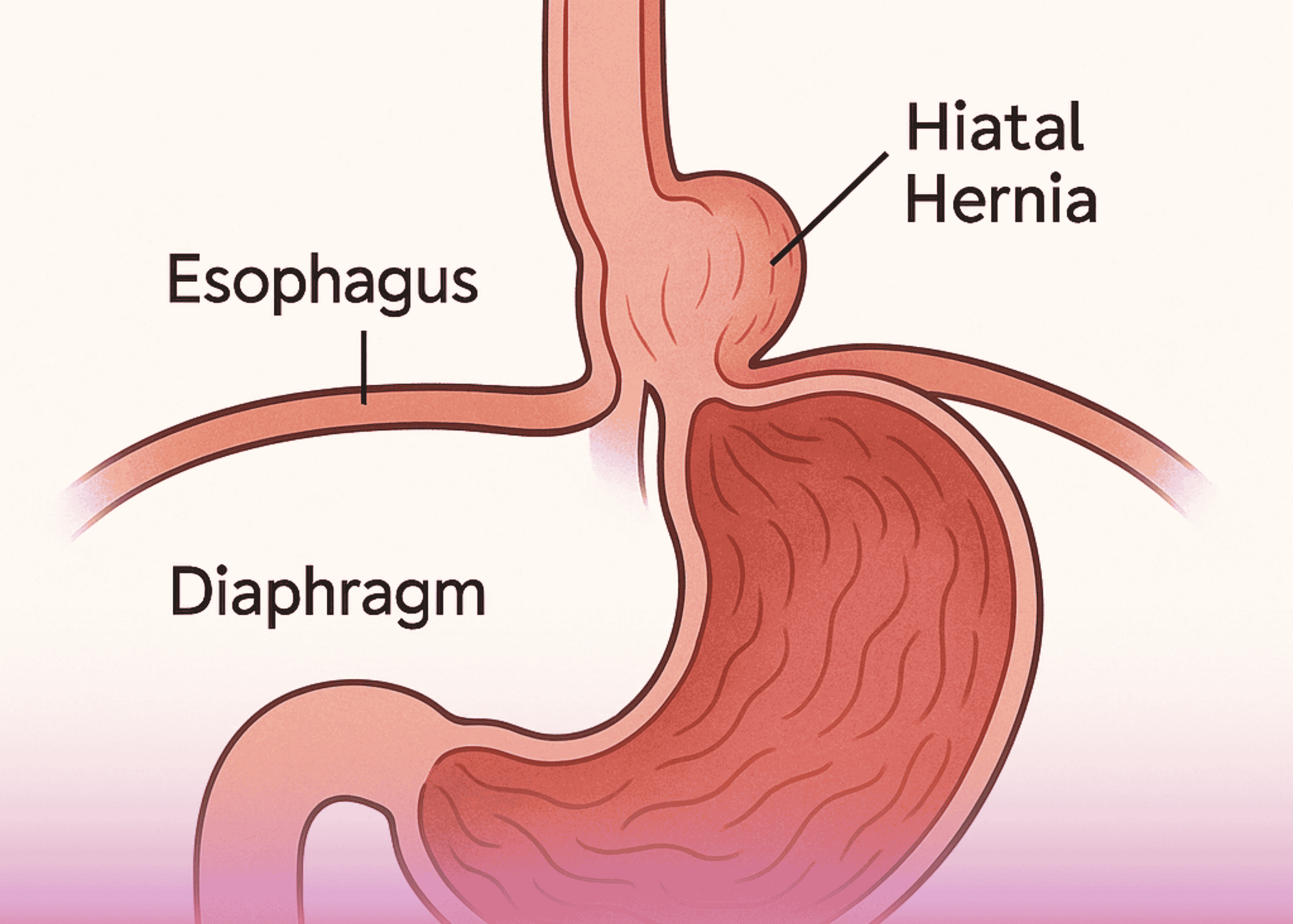A hiatal hernia can be a hidden cause of digestive discomfort, heartburn, and acid reflux. At Burjeel Medical City, we specialize in hiatal hernia treatments with advanced diagnostic and surgical care, including robotic hiatal hernia repair and laparoscopic surgery, offering patients effective, minimally invasive solutions.
What Is a Hiatal Hernia?
A hiatal hernia occurs when the upper part of the stomach pushes through the hiatus—the opening in the diaphragm—into the chest cavity. This can affect the normal function of the lower esophageal sphincter (LES), often leading to gastroesophageal reflux disease (GERD), which causes acid to flow back into the esophagus.
Common hiatal hernia symptoms include:
At Burjeel Medical City, we use advanced minimally invasive procedures to treat hiatal hernias, including laparoscopic and robotic surgery. Surgical techniques are chosen based on the hernia’s size, type, and patient-specific factors. Options include:
- Frequent heartburn or acid reflux
- Regurgitation of food or sour liquid
- Difficulty swallowing
- Chest or upper abdominal pain
- A sensation of fullness after small meals
- Shortness of breath (in larger hernias)
Understanding the condition and its potential effects is crucial to preventing complications and improving quality of life.
Types of Hiatal Hernia
There are three primary types of hiatal hernias:
- Sliding Hiatal Hernia
The most common type. The stomach and lower esophagus slide up through the diaphragm. Symptoms often mimic GERD.
- Paraesophageal Hiatal Hernia
Less common but potentially more dangerous. The stomach pushes up next to the esophagus, and in rare cases, can become strangulated—a surgical emergency.
- Mixed (Sliding + Paraesophageal)
A combination of both, typically seen in larger or more complex cases.
When Is Surgery Needed?
While many cases are managed with medication and lifestyle changes, surgery for hiatal hernia may be required when:
- Symptoms are severe or do not respond to medications
- The hernia is large or worsening
- There is significant GERD with esophageal damage
- There is risk of hernia strangulation or obstruction
Our expert team at Burjeel Medical City carefully evaluates each case to determine the most appropriate course of treatment.
Surgical Options for Hiatal Hernia Treatment
At Burjeel Medical City, we use advanced minimally invasive procedures to treat hiatal hernias, including laparoscopic and robotic surgery. Surgical techniques are chosen based on the hernia’s size, type, and patient-specific factors. Options include:
1. Hernia Repair with Nissen Fundoplication
This is the most common surgical treatment for hiatal hernias associated with GERD. The surgeon wraps the upper part of the stomach (the fundus) around the lower esophagus to reinforce the LES and prevent acid reflux. It is typically performed via laparoscopic surgery.
2. Partial Fundoplication (Toupet or Dor Fundoplication)
In patients where a full 360-degree wrap (Nissen) is not suitable, a partial wrap may be performed:
- Toupet Fundoplication involves a 270-degree posterior wrap.
- Dor Fundoplication is an anterior 180–200-degree wrap.
These options are also performed minimally invasively and tailored to patients’ esophageal motility.
3. Hernia Repair with Mesh Reinforcement
In cases of large or recurrent hiatal hernias, laparoscopic hiatal hernia repair with mesh is recommended. A biocompatible mesh is used to strengthen the diaphragm and prevent recurrence while minimizing complications.
All these techniques can be performed using robotic hiatal hernia repair, offering increased precision, less postoperative pain, and faster recovery.
Recovery Time After Surgery
Recovery from minimally invasive hiatal hernia repair is typically smooth and faster compared to open surgery:
- Most patients return home within 24–48 hours
- Light activities can resume within a week
- Full recovery generally takes 2–4 weeks
- Dietary adjustments are advised for a few weeks post-surgery
Our team at Burjeel Medical City provides thorough postoperative care to ensure a safe and successful recovery.
What to Avoid with Hiatal Hernia
Post-surgery and for those managing hiatal hernias non-surgically, lifestyle and dietary changes play a key role in symptom control. Here’s what to avoid with hiatal hernia:
- Large, heavy meals
- Spicy, acidic, and fatty foods
- Carbonated drinks and caffeine
- Alcohol and tobacco
- Lying down soon after eating
- Wearing tight clothing around the abdomen
Regular follow-ups, weight management, and sleep position adjustments (like elevating the head of the bed) can further support symptom relief.
Why Choose Burjeel Medical City?
Burjeel Medical City is a leader in advanced gastrointestinal surgery in the UAE. Our multidisciplinary team offers:
- Expertise in laparoscopic and robotic hiatal hernia repair
- Access to the latest technologies and minimally invasive techniques
- Personalized care plans tailored to each patient
- World-class facilities and compassionate support
Take the First Step Toward Relief
If you’re experiencing persistent hiatal hernia symptoms or chronic acid reflux, don’t ignore them. Schedule a consultation with gastro at Burjeel Medical City to explore your options for safe, effective, and minimally invasive treatment.


